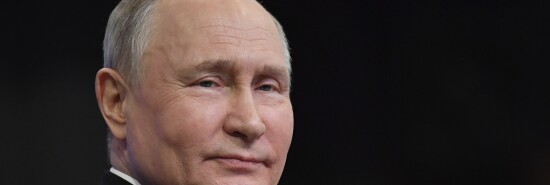
Putin is smiling. But he shouldn’t be too happy
Daniel DePetris
Video Embed
Russian President Vladimir Putin skipped his traditional, long-winded annual press conference last year — for good reason. Despite the sweet nothings churned out by the Kremlin’s propaganda machine, his war of choice in Ukraine wasn’t going well. In March and April 2022, the mighty Russian army was forced to give up on its quest to take Kyiv. In September, it ran away like a bunch of headless chickens as the Ukrainian army executed a stealth counteroffensive in the Kharkiv region. Two months later, Russian forces left Kherson city.
This year, things are looking a bit better for the Russians, although the bar is very low. Despite losing approximately 315,000 men to death and injury since the war began in February 2022, Putin apparently thought it was safe to take questions again. Similar to past end-of-year news conferences, the four-hour session was a stew of revisionist history, West-bashing, delusions, and steely self-confidence.
SHADOW OF DOUBT: FBI ‘KEENLY FOCUSED’ ON ‘ELEVATED’ RISK OF OUTSIDE INFLUENCE IN 2024 ELECTION
The Russian strongman bragged about the turnaround of the Russian economy, which, after all, has been mobilized to churn out tanks, ammunition, and other military equipment for the war. He broached the subject of Americans detained in Russia, suggesting that Moscow would be more than happy to trade Wall Street Journal reporter Evan Gershkovich and Paul Whelan for Russians detained in American prisons. (Last week, State Department spokesman Matthew Miller said the Biden administration made “a significant proposal” to Moscow, which was rejected.) Putin crowed about the professional conduct of the Russian military as opposed to how the Israel Defense Forces are acting in Gaza, alleging that the Russians weren’t committing any crimes during the course of their operations, which only a fool would believe.
As one would expect, the war in Ukraine received much of the attention. Putin reiterated that Moscow’s original objectives remained intact and that the Russian army would fight until the mission was achieved. “There will be peace when we achieve our goals,” Putin said. Those goals include Ukraine’s “denazification,” demilitarization, and neutrality. In layman’s terms: Ukraine’s total and full capitulation. If Putin had any second thoughts about whether Russia’s original, maximalist mission was actually possible, those doubts seem to have evaporated.
It’s difficult to put yourself in Putin’s shoes and not feel at least a little relief.
While the Ukrainian army remains steadfast and hasn’t lost an ounce of motivation, it is almost entirely dependent on the West for the ammunition, armor, and enablers required to fight the war. And let’s face it: From Ukrainian President Volodymyr Zelensky’s standpoint, the West is looking a bit wobbly.
A growing number of Republican lawmakers are tired of writing checks for what they see as an endless stalemate. Zelensky’s visit to Washington this week, where he briefed members of Congress, didn’t seem to have much of an effect in moving the latest Ukraine aid package any closer to passage. House Speaker Mike Johnson is just as insistent on leveraging the Biden administration’s $106 billion national security supplemental request ($61 billion of which is reserved for Ukraine) to White House acquiescence on tougher immigration policies. This, in turn, is landing Biden in hot water with progressives, who are increasingly concerned that the White House will codify Trump-era deportation rules.
Things aren’t looking especially great in European capitals either. The European Union is bogged down in an internal debate about how to unlock more than $50 billion to support Ukraine’s budget, which EU leadership argues is essential for Kyiv to avoid austerity measures on non-war funding. The problem: Hungary’s Viktor Orban isn’t inclined to play ball and wants the EU, an institution he hates with a passion, to unlock billions of euros that Brussels is withholding from Hungary over rule-of-law backsliding.
Europe is more populist today than it was last year, with elections in Slovakia and the Netherlands having produced leaders who won’t rubber-stamp whatever European policy elites want. In Germany, the far-right Alternative for Germany is now polling in second place nationally. The situation could get more complicated depending on this summer’s European Parliament elections.
It’s no wonder Putin is smiling. Yet he shouldn’t be smiling too much. Even if Ukraine is forced to change its tactics, success for Russia isn’t assured. The Russian army has been a laughingstock. As much as we talk about the Ukrainian army’s failed counteroffensive, it’s important to note that the Russians haven’t taken anything substantial since summer 2022, when Severodonetsk and Lysychansk were swallowed up after months of artillery barrages. Bakhmut, a mid-sized city, was taken by the Russians in May but at the cost of 20,000 casualties. While we shouldn’t underestimate the Russian military, the last 22 months show that we shouldn’t overestimate them either.
CLICK HERE TO READ MORE FROM THE WASHINGTON EXAMINER
Daniel DePetris (@DanDePetris) is a contributor to the Washington Examiner’s Beltway Confidential blog. His opinions are his own.
